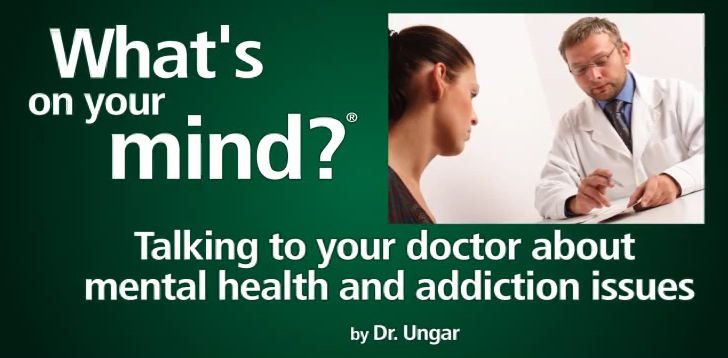Therapy, medication and self-care
Therapy
Therapy can be delivered by different mental health professionals and through different approaches.
How can I find the right therapist for me?
- Talk to your physician – Tell your physician about your concerns and need for psychological support. They will help identify the right therapy approach and may refer you to a therapist.
- Talking to your doctor about your mental health – Check out this guide, created as part of Manulife’s What’s on your mind?® series with Dr. Thomas Ungar, Associate Professor at the University of Toronto and Chief of Psychiatry at North York General Hospital.
- Employee and Family Assistance Program (EFAP) - Contact your employer to see if you have an EFAP you can access (it is usually counselling that is of no cost to you).
- Find a psychologist – Use this Canadian Register of Health Service Psychologists directory to help find a psychologist located near you. If you have a group benefits plan through your employer, you should check to see if psychologists are included under your extended health care as a covered service.
What are some common therapeutic approaches?
- Cognitive-behavioral (CBT) emphasizes learning to recognize and change negative thought patterns and behaviours, improving how feelings and worries are handled, and breaking the cycle of dysfunctional habitual behaviours. It aims to help people see the connection between how they think, what they tell themselves, and the feelings and actions that follow.
- Interpersonal Therapy (IPT) emphasizes identifying and understanding self-defeating patterns in relationships, figuring out why a particular situation is happening in a particular context, changing patterns that don’t work and developing healthier ones. In this approach, relationships and the here-and-now are the focus.
- Systemic approaches look at problems in the context of other people and social relationships, and focus on understanding and shifting the current dynamics of relationships, families, and even work settings.
- Mindfulness-based interventions may also be integrated into therapy and are becoming increasingly common. Mindfulness refers to developing the ability to connect to the present moment rather than dwelling on regrets about the past or worries about the future. Connecting to the present allows us to create new and healthier ways to respond to life’s challenges.
What might I expect from therapy?
- You should feel comfortable with your therapist. Trust and honesty are crucial to a collaborative and efficient therapeutic relationship.
- During the initial session, the therapist will gather information about you, your life and your concerns. This is called the initial assessment.
- “Don’t just sit there.” Therapy is a team effort and you need to take an active part in the session to make the experience valuable and beneficial for you.
- Be prepared. Write down some thoughts or points you want to discuss in therapy.
- Ask questions about the process and expectations.
- Be open to the process.
What is the difference between a psychiatrist and a psychologist?
A psychiatrist has a degree in medicine plus a specialization in psychiatry.They are able to prescribe psychotropic medication. You need a referral from your family doctor or a physician to see a psychiatrist.
A psychologist has post graduate training in psychology and has been licensed by the psychological regulatory body in the province or territory where they practice.They cannot prescribe medication and a referral is not needed to book an appointment with them.
Both psychiatrists and psychologists specialize in the assessment and treatment of mental health issues. They often work together to provide a more comprehensive set of services to individuals requiring both medication and psychotherapy.
Are there other health providers that can do therapy?
Yes. Depending on the nature of your situation, it is possible that your physician will refer you to other mental health professionals, such as a mental health nurse or social worker.
Do therapy and counselling mean the same thing?
Yes.Those words are interchangeable because mental health therapists/counsellors do both things. They use counselling to connect with their clients and build a relationship, and use therapies to facilitate change.
- Margolies, L. (2010). Understanding Different Approaches to Psychotherapy. Psych Central
Medication
Medication is often part of the treatment for mental health conditions. Consult with your physician to get advice about the medication that is appropriate for you. To make the most of your visit with your doctor, here are some things you can do to prepare:
- Put together a list of your symptoms, including how often you experience each of them, how long they last and when they appear.
- Write down any medication, vitamins or supplements you are already taking.
- Think about any life stresses or changes you have gone through recently.
It is important to be educated about medication that is taken for mental health conditions. Here are some general questions that may be asked of a doctor or pharmacist:
- How long will it take before I feel better?
- How often and how much do I take?
- What are the possible side effects, if any, and what can I do to best manage them?
- Will this medication interfere with other medication(s) or herbal remedies that I take?
- Do I have allergies to this medication?
- What should I do if I don’t feel better or if I miss a dose?
- Is there any written information I can get about this medication?
- Is there anything I should not do when taking this medication (e.g., drive, operate heavy machinery, consume alcohol)?
What are some common types of medication?
If necessary, a treating physician will prescribe the most suitable treatment medication for your condition. If your doctor prescribes medication, it is important to take it regularly and as recommended. Be patient. Restoring balance in the brain can take time. To avoid a relapse, it is very important to continue the treatment as prescribed, even if you are feeling better. Treating the first episode of a mood disorder can take anywhere from several months to one or two years, depending on its severity and response to treatment. Here is some general information about different types of medication. You will need to consult your physician about specific medications, how they work, their purpose and method of prescription.
Antidepressants
- Act by restoring the balance between the neurotransmitters in the brain that regulate emotions, cognitive function (memory, concentration, etc.), and somatic functions (sleep, appetite, energy, etc.).
- Often used to treat depression and anxiety disorders.
- Not all antidepressants have official indications for the treatment of all anxiety disorders and sometimes it is a matter of trying different medications to determine the most effective kind and dose. Treatment usually starts at a much lower dose than for treating depression.
Anxiolytic medications
- May help with acute anxiety or agitation or while other medications have not yet taken effect.
- Act by restoring the balance between the neurotransmitters in the brain that regulate emotions, cognitive function (memory, concentration, etc.), and somatic functions (fear reactions affecting heart rate, breathing, and so on).
- They are often prescribed with caution because of their potential for dependence.
Mood stabilizers
- Often prescribed to treat bipolar disorder.
- Act by restoring balance between neurotransmitters in the brain that regulate emotions, cognitive function (memory, concentration, etc.), and somatic functions of manic or depressive mood manifestation (atypical level of energy, unusual self-confidence or self-criticism, etc.).
- A treatment program should be developed based on the predominant mood with mood-stabilizing medications alone or in combination with antidepressants. It may take time and several trials before finding the appropriate dosage and combination of medication.
Self-care - take care of yourself!
A healthy lifestyle can have a direct impact on your recovery. Here are some tips that may help you feel better:
- Stick to a regular sleep schedule and ensure you are getting seven to eight hours of sleep per night
- Keep up with proper and healthy nutrition
- Stay active
- Do not isolate yourself
- Find activities that you enjoy and make participation a priority
- Know your stress triggers
- Embrace the support of friends, family and co-workers
- Follow your physician’s medical recommendations and prescriptions







